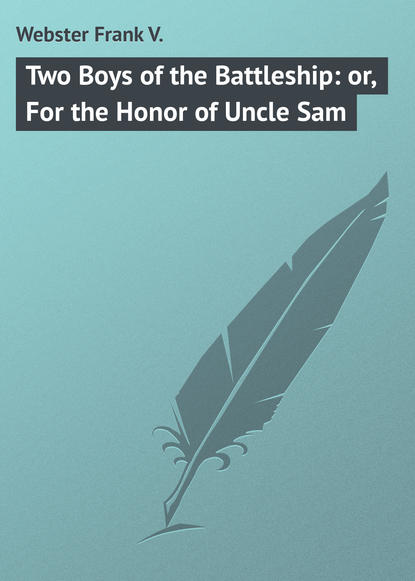По всем вопросам обращайтесь на: info@litportal.ru
(©) 2003-2024.
✖
Two Boys of the Battleship: or, For the Honor of Uncle Sam
Настройки чтения
Размер шрифта
Высота строк
Поля
“Thank you,” said Frank, “I don’t hold any grudge.”
“I’m glad of it,” responded Hank. “I know I’ve been rotten, but I’m through. It was fine of you to take me out. I shan’t forget it!”
“Three cheers for Frank Arden!” called some one.
They were given with a will that brought an officer on the run to see what was happening. But when he saw what it was he smiled and turned away.
“And three cheers for Hank Dell!” proposed Ned.
It would have puzzled any one to tell which cheers were the heartiest. And from then on, though occasionally he was up to some trick, the bully was a changed youth. He gave no more trouble, and Frank and Ned had no firmer friend. From being rather careless and neglectful of his progress, he became studious, and in this he was encouraged, for the officers are eager to have their men promoted.
“So that explosion was a good thing after all,” remarked Ned, some time later.
“Yes, though it looked mighty ticklish at the start,” responded Frank, with a smile.
There were other rifle practices as the weeks passed, sometimes with big guns, and more often with the small arms and quick firers. Ned and Frank went in for gunnery work, for which they seemed to have a peculiar aptitude, and in this they were encouraged by their superiors.
Quite often they wrote to their uncle, and also heard from him. Friends had reopened his case, but it was dragging slowly along, and there was no immediate prospect of his release.
“I wish we could help him,” said Frank, with a sigh.
“So do I,” chimed in Ned. “But how can we?”
There did not seem to be any way in which the boys could assist.
Drill and instruction went on unceasingly aboard the Georgetown. There are nine principal drills aboard a battleship. These are great gun drill; infantry and light artillery; boats, under oars or sails; signals; collisions and abandon ship; fire-quarters; general quarters; clear ship for action; and coaling ship.
Some days only one or two drills may be ordered, and on others none. Nor are they followed in the order given, for above everything else the government does not want life aboard ship to become monotonous. Often the drills were broken into by short, instructive talks by the officers.
In the succeeding chapters will be briefly told of what each drill consists.
It was one day following boat drill, when the small craft had come racing back in response to the recall signal, that Frank and Ned, whose boat had won an impromptu race, observed signs of unusual activity aboard.
“What’s up?” Frank asked a petty officer.
“Just got wireless orders,” was the answer. “We’re ordered South!”
“Ordered South?” echoed Ned. “Where?”
“Down to a small South American republic. Uridio it’s called. I never heard of it, but there’s some sort of a revolution there, and we’re ordered down to protect American interests. I didn’t know Uridio was on the map.”
“Well, we did,” said Frank in a low voice to his brother. “Oh, Ned! That’s where Uncle Phil’s property is. Maybe now we’ll get a chance to help him!”
CHAPTER XVI – HEAVY SEAS
Such eager hope shone on the faces of Frank and Ned Arden on hearing the news that the battleship was ordered to South America, that the sailor who had given them the information remarked:
“Say, you fellows must be glad of it!”
“We are!” declared Frank. “Why, aren’t you?”
“I should say not!” was the emphatic reply.
“You don’t mind because we may be mixed up in some fighting, do you?” asked Ned, in some surprise.
“Of course not! It’s the climate I object to. It’ll be hot down there – as hot as blazes, and if we have to go into action, and use the big guns, why being inside of the turrets will be worse than being in a teakettle.”
“Oh, I guess we can stand it,” returned Frank.
“Huh! Wait until you try it once,” went on the blue-jacket. “I was down in the tropics once when we had some evolutions, and say! I haven’t got rid of all the blisters yet. That’s what makes me wonder when I see you fellows showing all sorts of signs of joy!“
“Well, some of our money is invested down in that little republic, and we want a chance to see what it looks like,” Frank explained.
“Come off! What sort of talk are you giving me?” demanded the sailor. “Money invested, and you working for Uncle Sam? Tell me something easier to believe,” and he laughed in a good-natured way.
Frank and Ned exchanged meaning looks, and tacitly agreed that perhaps it would be better not to go into any explanation of the matter. It would be hard to convince the ordinary blue-jacket that the two battleship boys once possessed a considerable fortune that was now tied up because of political troubles in Uridio. It sounded more like a tale from a book, than the real thing, as Frank admitted to his brother later.
“So we’d just better keep still about it, I think,” he said. “Of course if we get a chance to do a good turn for Uncle Phil, and, incidentally ourselves, we will. We can speak to the captain or some of the officers about it, and we have papers that prove what we say is true. Only there is no use in going into all this to any of the sailors.”
“I guess you’re right,” admitted Ned. The two lads did have certain documents that would establish the truth of what they had said, namely, that their fortune, as well as that of their uncle, was tied up in investments in the “banana republic,” as the small countries of Central and South America are often called.
Matters regarding Mr. Arden’s affairs had not changed of late, according to the last advices received by the boys. They had not, as they had hoped, been able to visit him at Atlanta.
Their life at the naval training station had been more fully occupied than they had expected, and there was no time to take the trip to Georgia. They had regretted the matter very much at the time, and Mr. Arden was greatly disappointed at not seeing his nephews. But he knew it could not be helped. Now, however, there might be a chance to do him a much greater service than would have resulted from a mere visit.
“Heat isn’t the only thing that’s disagreeable down in the tropics,” went on the sailor the next time he saw Frank and Ned.
“No?” asked Ned.
“I should say not! There’s no telling what sort of disease you may catch.”
“Well, I’m not going to try and catch any,” laughed Frank. “If some disease wants to catch me I’ll do my best to get away, too.”
“And there’s all sorts of bugs and crawling things,” continued the blue-jacket, making a wry face.
“Oh, don’t listen to him!” exclaimed Hank Dell, who, of late, had become quite chummy with Frank and Ned. “He’s a regular calamity-howler, he is!”
“Yes, and you’ll be a howler, too, when some of those South American chiggers get after you and burrow under your skin,” predicted the other as he went below.
The news that the Georgetown had been ordered to South American waters where there was a prospect of some real fighting, soon spread all over the ship. As boat after boat returned from the drill, and was hoisted to the davits, the sailors discussed the wireless message that had been received. Of course the enlisted men did not know any of the particulars, merely being told that the rather aimless cruising about, which had thus far marked the voyage, was at an end, and that orders had come to start South.
Now the Georgetown had a definite object in view, and it was rumored throughout the ship that hereafter drills would be stricter and that drills with the big guns would be more frequent.
“Of course we won’t stop for any target practice, though,” reasoned Ned.
“Hardly,” agreed Frank. “I guess, too, they won’t fire away many of the big, expensive projectiles. We may need them for Uridio.”
“Yes, we may have a run-in with their navy,” his brother said.










